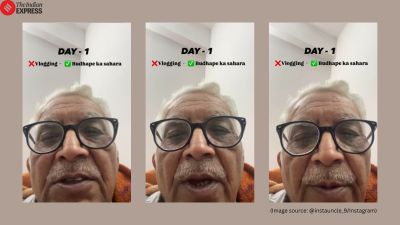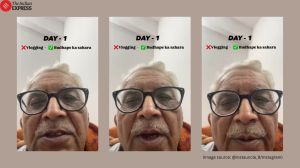Take NOTE
A health diary will help you keep track of your well-being
A health diary will help you keep track of your well-being
So,you8217;ve quit smoking,started eating healthy,joined a gym and even learned to smile at those who annoy you. But you can still do more for your well-being. Start maintaining a health diary. Remember how your mother would maintain a record of your vaccinations,height,weight and digestion when you were a child. Each time shed visit the hospital,the family pediatrician would update that record.
Dr S.K. Aggarwal,a senior internal medicine consultant with Indraprastha Apollo Hospital,Delhi,says that we should ideally continue with that record or diary for the rest of our lives. But adults who dumped their childhood health diaries or records after they entered adolescence or teenage,can start now from scratch, he suggests.
So what should you jot down in a health diary? Your medical conditions,illnesses,whether,when and for what were you hospitalised,family history of diseases,allergies to drugs and certain foods, says Dr Virender Anand,an internal medicine consultant with Moolchand Medcity,Delhi.
If you are in your 20s,you could also write down your childhood vaccinations,adult vaccinations,infections and injuries. A 30-something must note changes to his or her diet plan since most people modify their diet when they hit 30,giving up of any addiction such as smoking and weight since people put on weight due to hormonal changes. Those in their 40s should write down the last time they got a health check-up done and whether it included a treadmill test or a chest X-ray.
If you post in your diary that you once had an allergic reaction to aspirin or an antibiotic,that would help the doctor prescribe you the right drug. That way,a health diary could be a diagnostic tool,says Dr Anand. Say,a patient consults me for a skin lesion and give me his diary,which shows that he has had gluten intolerance in the past. That will help me diagnose that his current skin lesion is because of his food allergy. A health diary establishes links between different factors you record and can show a pattern in your bodys behaviour, he says.
A health diary becomes specially significant as,Dr Aggarwal says,most people throw away the prescription of a doctor,after some time has lapsed. But that doesnt mean you clip your doctors prescriptions into a file and assume that to be a health diary. Do keep a record of the prescriptions but a health diary is a separate document altogether.
Unlike a food diary,you dont have to update a health diary often. Revise it only when youve encountered a medical condition and resorted to a medication such as when you had a sore throat and had to take medicine to relieve it or when youve made a significant change to your lifestyle,such as when you quit smoking or alcohol.
A health diary would serve as a memory tool and give a timeframe to your medical profile. Most people who have had a blood pressure problem in the past would remember it but would not be able to recall when exactly it happened. It could be 10 years ago or even 15 years back. But if you jot down in your diary when you fell unconscious because of low blood pressure and what year and month it was,it would help the doctor diagnose your problem in the future, says Dr Anand.
And the best part about the health diary is its simple. Dont copy-paste your doctors prescription in your diary. Dont use medical jargon either. Write it in simple terms that you can understand and would be able to comprehend many years later. Also,avoid details such as the dosage of a drug takenthat could be found in your file of prescriptions. Make this task as less cumbersome as you can so that you would want to do it, says Dr Anand.
- 01
- 02
- 03
- 04
- 05






























